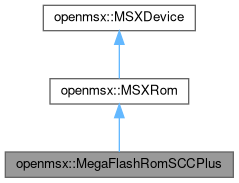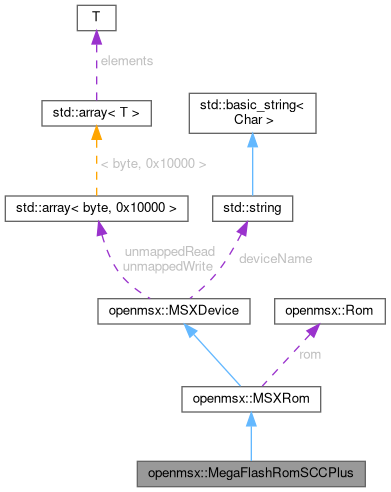#include <MegaFlashRomSCCPlus.hh>


Public Member Functions | |
| MegaFlashRomSCCPlus (const DeviceConfig &config, Rom &&rom) | |
| ~MegaFlashRomSCCPlus () override | |
| void | powerUp (EmuTime::param time) override |
| This method is called when MSX is powered up. | |
| void | reset (EmuTime::param time) override |
| This method is called on reset. | |
| byte | peekMem (word address, EmuTime::param time) const override |
| Read a byte from a given memory location. | |
| byte | readMem (word address, EmuTime::param time) override |
| Read a byte from a location at a certain time from this device. | |
| const byte * | getReadCacheLine (word address) const override |
| Test that the memory in the interval [start, start + CacheLine::SIZE) is cacheable for reading. | |
| void | writeMem (word address, byte value, EmuTime::param time) override |
| Write a given byte to a given location at a certain time to this device. | |
| byte * | getWriteCacheLine (word address) override |
| Test that the memory in the interval [start, start + CacheLine::SIZE) is cacheable for writing. | |
| void | writeIO (word port, byte value, EmuTime::param time) override |
| Write a byte to a given IO port at a certain time to this device. | |
| template<typename Archive > | |
| void | serialize (Archive &ar, unsigned version) |
 Public Member Functions inherited from openmsx::MSXRom Public Member Functions inherited from openmsx::MSXRom | |
| void | writeMem (word address, byte value, EmuTime::param time) override |
| Write a given byte to a given location at a certain time to this device. | |
| byte * | getWriteCacheLine (word address) override |
| Test that the memory in the interval [start, start + CacheLine::SIZE) is cacheable for writing. | |
| void | getExtraDeviceInfo (TclObject &result) const override |
| void | getInfo (TclObject &result) const |
| Add dict values with info to result. | |
| RomType | getRomType () const |
 Public Member Functions inherited from openmsx::MSXDevice Public Member Functions inherited from openmsx::MSXDevice | |
| MSXDevice (const MSXDevice &)=delete | |
| MSXDevice (MSXDevice &&)=delete | |
| MSXDevice & | operator= (const MSXDevice &)=delete |
| MSXDevice & | operator= (MSXDevice &&)=delete |
| virtual | ~MSXDevice ()=0 |
| const HardwareConfig & | getHardwareConfig () const |
| Returns the hardwareconfig this device belongs to. | |
| void | testRemove (std::span< const std::unique_ptr< MSXDevice > > removed) const |
| Checks whether this device can be removed (no other device has a reference to it). | |
| virtual byte | readIRQVector () |
| Gets IRQ vector used in IM2. | |
| virtual void | powerDown (EmuTime::param time) |
| This method is called when MSX is powered down. | |
| virtual const std::string & | getName () const |
| Returns a human-readable name for this device. | |
| virtual void | getNameList (TclObject &result) const |
| Returns list of name(s) of this device. | |
| void | getDeviceInfo (TclObject &result) const |
| Get device info. | |
| void | getVisibleMemRegion (unsigned &base, unsigned &size) const |
| Returns the range where this device is visible in memory. | |
| virtual byte | readIO (word port, EmuTime::param time) |
| Read a byte from an IO port at a certain time from this device. | |
| virtual byte | peekIO (word port, EmuTime::param time) const |
| Read a byte from a given IO port. | |
| virtual void | globalWrite (word address, byte value, EmuTime::param time) |
| Global writes. | |
| virtual void | globalRead (word address, EmuTime::param time) |
| Global reads. | |
| void | invalidateDeviceRWCache () |
| Calls MSXCPUInterface::invalidateXXCache() for the specific (part of) the slot that this device is located in. | |
| void | invalidateDeviceRCache () |
| void | invalidateDeviceWCache () |
| void | invalidateDeviceRWCache (unsigned start, unsigned size) |
| void | invalidateDeviceRCache (unsigned start, unsigned size) |
| void | invalidateDeviceWCache (unsigned start, unsigned size) |
| void | fillDeviceRWCache (unsigned start, unsigned size, byte *rwData) |
| Calls MSXCPUInterface::fillXXCache() for the specific (part of) the slot that this device is located in. | |
| void | fillDeviceRWCache (unsigned start, unsigned size, const byte *rData, byte *wData) |
| void | fillDeviceRCache (unsigned start, unsigned size, const byte *rData) |
| void | fillDeviceWCache (unsigned start, unsigned size, byte *wData) |
| MSXMotherBoard & | getMotherBoard () const |
| Get the mother board this device belongs to. | |
| const XMLElement & | getDeviceConfig () const |
| Get the configuration section for this device. | |
| const DeviceConfig & | getDeviceConfig2 () const |
| const Devices & | getReferences () const |
| Get the device references that are specified for this device. | |
| EmuTime::param | getCurrentTime () const |
| MSXCPU & | getCPU () const |
| MSXCPUInterface & | getCPUInterface () const |
| Scheduler & | getScheduler () const |
| MSXCliComm & | getCliComm () const |
| Reactor & | getReactor () const |
| CommandController & | getCommandController () const |
| PluggingController & | getPluggingController () const |
| LedStatus & | getLedStatus () const |
| template<typename Archive > | |
| void | serialize (Archive &ar, unsigned version) |
Additional Inherited Members | |
 Public Types inherited from openmsx::MSXDevice Public Types inherited from openmsx::MSXDevice | |
| using | Devices = std::vector< MSXDevice * > |
 Static Public Attributes inherited from openmsx::MSXDevice Static Public Attributes inherited from openmsx::MSXDevice | |
| static std::array< byte, 0x10000 > | unmappedRead |
| static std::array< byte, 0x10000 > | unmappedWrite |
 Protected Member Functions inherited from openmsx::MSXRom Protected Member Functions inherited from openmsx::MSXRom | |
| MSXRom (const DeviceConfig &config, Rom &&rom) | |
 Protected Member Functions inherited from openmsx::MSXDevice Protected Member Functions inherited from openmsx::MSXDevice | |
| MSXDevice (const DeviceConfig &config, std::string_view name) | |
| Every MSXDevice has a config entry; this constructor gets some device properties from that config entry. | |
| MSXDevice (const DeviceConfig &config) | |
| virtual void | init () |
| virtual unsigned | getBaseSizeAlignment () const |
| The 'base' and 'size' attribute values need to be at least aligned to CacheLine::SIZE. | |
| virtual bool | allowUnaligned () const |
| By default we don't allow unaligned <mem> specifications in the config file. | |
| byte | getPrimarySlot () const |
 Protected Attributes inherited from openmsx::MSXRom Protected Attributes inherited from openmsx::MSXRom | |
| Rom | rom |
 Protected Attributes inherited from openmsx::MSXDevice Protected Attributes inherited from openmsx::MSXDevice | |
| std::string | deviceName |
Detailed Description
Definition at line 12 of file MegaFlashRomSCCPlus.hh.
Constructor & Destructor Documentation
◆ MegaFlashRomSCCPlus()
| openmsx::MegaFlashRomSCCPlus::MegaFlashRomSCCPlus | ( | const DeviceConfig & | config, |
| Rom && | rom | ||
| ) |
Definition at line 186 of file MegaFlashRomSCCPlus.cc.
◆ ~MegaFlashRomSCCPlus()
|
override |
Definition at line 198 of file MegaFlashRomSCCPlus.cc.
References openmsx::MSXDevice::getCPUInterface(), and openmsx::MSXCPUInterface::unregister_IO_Out_range().
Member Function Documentation
◆ getReadCacheLine()
Test that the memory in the interval [start, start + CacheLine::SIZE) is cacheable for reading.
If it is, a pointer to a buffer containing this interval must be returned. If not, a null pointer must be returned. Cacheable for reading means the data may be read directly from the buffer, thus bypassing the readMem() method, and thus also ignoring EmuTime. The default implementation always returns a null pointer. The start of the interval is CacheLine::SIZE aligned.
Reimplemented from openmsx::MSXDevice.
Definition at line 327 of file MegaFlashRomSCCPlus.cc.
References openmsx::CacheLine::HIGH, and openmsx::MSXDevice::unmappedRead.
◆ getWriteCacheLine()
Test that the memory in the interval [start, start + CacheLine::SIZE) is cacheable for writing.
If it is, a pointer to a buffer containing this interval must be returned. If not, a null pointer must be returned. Cacheable for writing means the data may be written directly to the buffer, thus bypassing the writeMem() method, and thus also ignoring EmuTime. The default implementation always returns a null pointer. The start of the interval is CacheLine::SIZE aligned.
Reimplemented from openmsx::MSXDevice.
Definition at line 487 of file MegaFlashRomSCCPlus.cc.
◆ peekMem()
|
overridevirtual |
Read a byte from a given memory location.
Reading memory via this method has no side effects (doesn't change the device status). If save reading is not possible this method returns 0xFF. This method is not used by the emulation. It can however be used by a debugger. The default implementation uses the cache mechanism (getReadCacheLine() method). If a certain region is not cacheable you cannot read it by default, Override this method if you want to improve this behaviour.
Reimplemented from openmsx::MSXDevice.
Definition at line 273 of file MegaFlashRomSCCPlus.cc.
References openmsx::AmdFlash::peek(), and openmsx::SCC::peekMem().
◆ powerUp()
|
overridevirtual |
This method is called when MSX is powered up.
The default implementation calls reset(), this is usually ok.
- Parameters
-
time The moment in time the power up occurs.
Reimplemented from openmsx::MSXDevice.
Definition at line 203 of file MegaFlashRomSCCPlus.cc.
References openmsx::SCC::powerUp(), and reset().
◆ readMem()
Read a byte from a location at a certain time from this device.
The default implementation returns 255.
Reimplemented from openmsx::MSXDevice.
Definition at line 300 of file MegaFlashRomSCCPlus.cc.
References openmsx::AmdFlash::read(), and openmsx::SCC::readMem().
◆ reset()
|
overridevirtual |
This method is called on reset.
Default implementation does nothing.
Reimplemented from openmsx::MSXDevice.
Definition at line 209 of file MegaFlashRomSCCPlus.cc.
References openmsx::MSXDevice::invalidateDeviceRCache(), ranges::iota(), openmsx::AmdFlash::reset(), openmsx::AY8910::reset(), and openmsx::SCC::reset().
Referenced by powerUp().
◆ serialize()
| void openmsx::MegaFlashRomSCCPlus::serialize | ( | Archive & | ar, |
| unsigned | version | ||
| ) |
Definition at line 505 of file MegaFlashRomSCCPlus.cc.
◆ writeIO()
|
overridevirtual |
Write a byte to a given IO port at a certain time to this device.
The default implementation ignores the write (does nothing)
Reimplemented from openmsx::MSXDevice.
Definition at line 493 of file MegaFlashRomSCCPlus.cc.
References openmsx::AY8910::writeRegister().
◆ writeMem()
|
overridevirtual |
Write a given byte to a given location at a certain time to this device.
The default implementation ignores the write (does nothing).
Reimplemented from openmsx::MSXDevice.
Definition at line 352 of file MegaFlashRomSCCPlus.cc.
References openmsx::SCC::Compatible, openmsx::MSXDevice::invalidateDeviceRCache(), openmsx::SCC::Plus, openmsx::SCC::setMode(), openmsx::AmdFlash::write(), openmsx::SCC::writeMem(), and xrange().
The documentation for this class was generated from the following files: